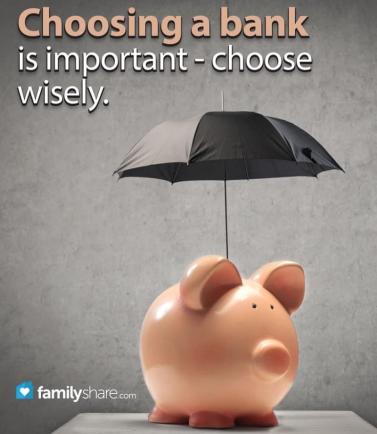
Most people take their bank for granted. The fact is, however, that having a bank where your paycheck is deposited and from which you can write checks, access cash through ATMs and keep track of it all on-line is a key part of managing your family's finances. Choosing a bank is important.
Here are some factors to consider when you choose a bank:
Fees
Fees for banking services vary widely. Many banks offer "no frills" accounts with no fees, but just what services are included in that account will vary. Sometimes the free account will require an employer's direct deposit - no problem if you get direct deposit. Be sure to compare a few banks to get a sense of all of the available services that you want and what they'll cost at each bank.
Branches
Most people don't need to go to the bank very often anymore. That said, when you do, you don't want to drive clear across town. Look for a bank with a nearby branch.
ATM Network
Be sure to determine which ATM network the bank is on. Most large banks are part of multiple networks so you can get money from virtually any bank. Community banks and credit unions are not necessarily as connected. If you bank with a big national bank, you can get no-fee access at the ATMs all around the country. Your credit union may belong to a credit union network with free access ATMs in many places. Check it out. No bank has a truly global network, so if you're a world traveler expect to pay some ATM fees.
Internet access
Virtually all banks offer some internet access to accounts, allowing you to see your account. Most U.S. banks also allow you to pay bills (mostly by having the bank print a check (or draft) for you and putting it in the mail for you.) Outside the U.S., electronic payment systems are often much more advanced - allowing you to pay all bills electronically. (Checks are almost unheard of outside the U.S. One wonders why the U.S. is stuck in the 19th century in this regard.)
Interest rates
It is reasonable to look at interest rates as a point of comparison, but remember, interest rates change every day. When a bank is trying to grow its deposit base, it will offer higher interest rates. At a later time, the same bank may not need to increase deposits and may be offering lower rates. As a result, choosing a bank based on interest rates may be a bad bet. Unless you have large sums of money, the difference in interest rates on your deposits will be too small to matter. If you'd earn $1 on your checking account at one bank and $2 at another, that is almost irrelevant. Fees and convenience overwhelm this consideration.
Other services
One reason to have a bank is to establish a relationship so that when you need a credit card, car loan, mortgage loan or student loan you can get one. In this regard, smaller institutions like community banks and credit unions, may offer a small advantage. Some banks and credit unions don't offer all of these services. If you may be interested in these services in the future, make sure they offer them now.
Customer service
As a final check, you may want to actually visit the banks that you view as candidates. By visiting them, you may get a feel for how customers are treated and how you'd enjoy banking there. Chances are, you'll be with this bank for a long time.
With these tips you can choose a better bank. Most people will only move a checking account once or twice in a lifetime. Choose wisely so you won't have to do it again!

